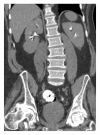Hyper IgE Syndrome and Renal Cell Carcinoma
- PMID: 28607797
- PMCID: PMC5451772
- DOI: 10.1155/2017/7083451
Hyper IgE Syndrome and Renal Cell Carcinoma
Abstract
Hyper IgE Syndrome (HIES) is an immunodeficiency disorder characterized by increased serum levels of IgE, eczema, and recurrent cutaneous and pulmonary infections. In this report, we present, to our knowledge, the first documented case of renal cell carcinoma (RCC) found in a patient with HIES. The patient received infectious disease clearance prior to obtaining a partial nephrectomy which revealed clear cell histology. Both HIES and RCC have an immunological basis for their pathophysiology and may involve common pathways. Further studies may provide insight into any possible link and clinicians should be mindful of immunocompromised patients who present with risk factors for genitourinary malignancy.
Figures
References
-
- Oztop I., Demirkan B., Tarhan O., et al. The development of pulmonary adenocarcinoma in a patient with Job's syndrome, a rare immunodeficiency condition. Tumori. 2004;90(1):132–135. - PubMed
-
- Salavoura K., Kolialexi A., Tsangaris G., Mavrou A. Development of cancer in patients with primary immunodeficiencies. Anticancer Research. 2008;28(2B):1263–1269. - PubMed
Publication types
LinkOut - more resources
Full Text Sources
Other Literature Sources



